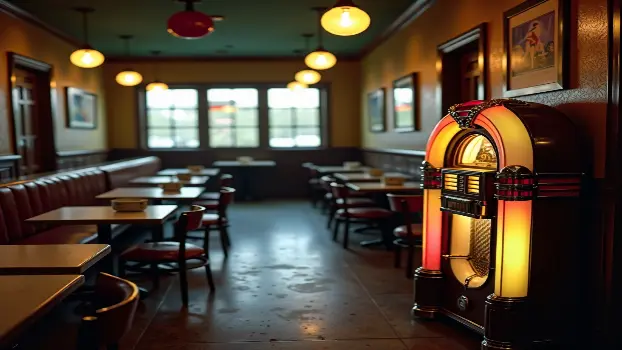
I think nostalgia in music, which means wanting to relive moments from the past, is more than just a quick memory. It’s a deep trip back in time that brings up many different feelings.
So, what is nostalgia in music?
When we shut our eyes and let a well-known melody flow over us, suddenly, we find ourselves not just in the present, but also retracing our past journeys: that sun-drenched beach vacation, your first slow dance, or even moments drenched in sadness.
A song from years ago could fill you with so much more than just a yearning for simpler times.
The influence of nostalgia in music creation encompasses the reflective moments we encounter when a particular melody strikes a chord within us, sometimes lifting us, other times gently leading us down memory lane, even if it’s a path marked with shadows.
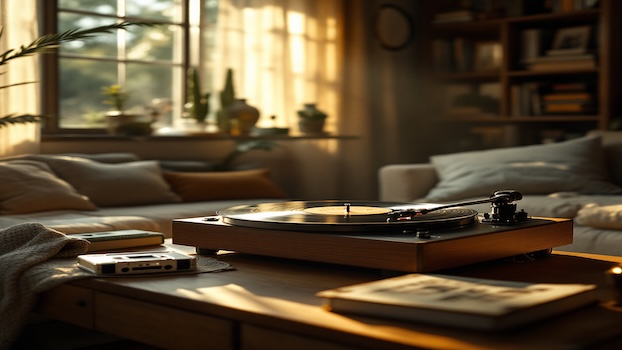
What’s amazing to me, is the capacity of a single piece of music to remind us of a loved one long gone or the excitement of a childhood with no responsibilities.
When you listen to a song, it’s not just about remembering a moment. It’s about the emotions it stirs and the memories it brings back to life, memories so vivid that they compel you to re-experience those emotions or even inspire you to recreate certain experiences.
So I’m here to help you understand – why do certain songs have the power to send us back in time?
It could be because they were playing during our formative years but I believe there‘s more to it than that. There’s a complex interplay going on in our brains that transforms a simple tune into a time machine. (88….miles…per..hour!)
Couldn’t help myself 😎
Think about how closely music and memory are connected. Next, we’ll look at how the brain helps explain why hearing certain songs can bring back strong memories from the past.
Looking for an amazing fun adventure down the nostalgic road? Check out the Professor of Rock! Adam Reader is a master of showcasing the behind-the-scenes nostalgia behind your favorite songs and bands.
Ever wondered why certain tunes seem like time machines, instantly whisking you back to moments once forgotten? The answer lies within the intricate workings of your brain.
When a classic song from your past begins to play, it’s not just your ears that perk up, your brain lights up too, like a Christmas tree adorned with memories.
Let’s get to the crux of it. The cerebral cortex, the brain’s major area associated with memory, perception, and consciousness, gets involved every time you hear that familiar melody.
The cerebellum, which is usually known for controlling movement, also helps when you listen to more complicated rhythms. This part of the brain can bring back memories of dances or workouts you did when you were younger.
Dopamine, a chemical in the brain that makes you feel good, is also involved. When you listen to music, dopamine is released, giving you a wave of pleasure and sometimes making you miss the past. This can make you feel happy or bring up many other emotions, depending on what the song reminds you of.
This is why some people become so ‘lost in the music‘ – they’re essentially bathing in a dopamine-triggered emotional journey.
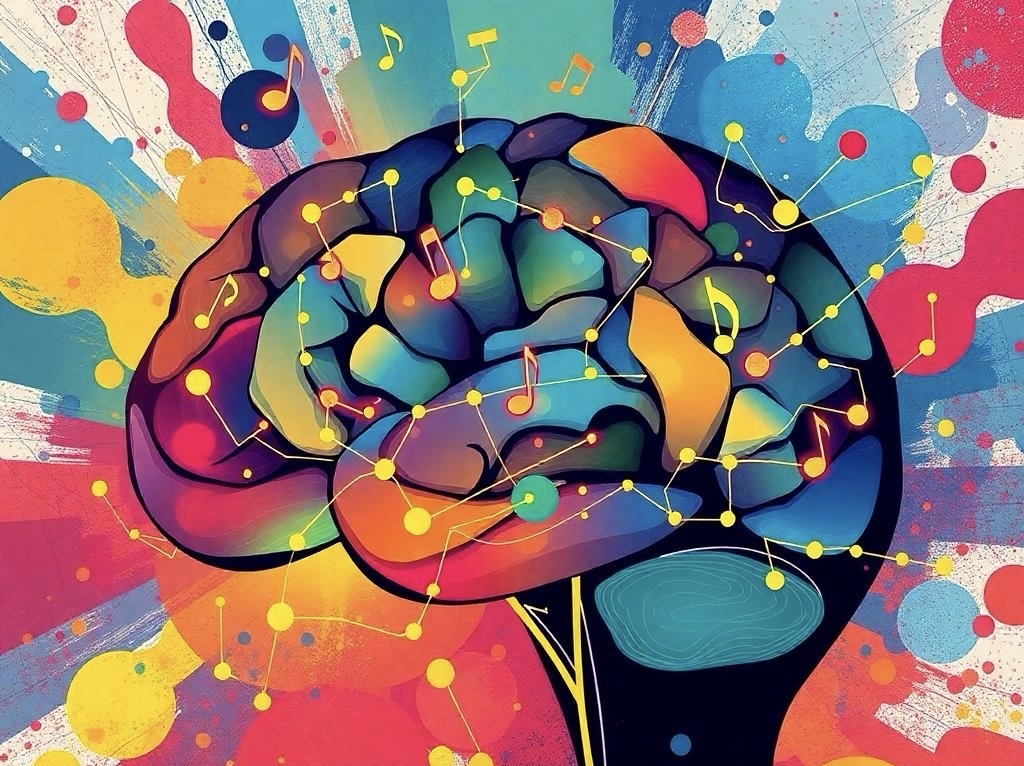
These brain reactions don’t work alone. When you listen to music, the auditory cortex handles the sounds, while the visual cortex also gets active. This matters because it helps show why music can bring back such clear pictures in your mind.
Hear a song from a beach trip, and you’ll practically feel the sand between your toes. In essence, that music is unlocking ‘sensory snapshots‘ that can transport you to different times and places in your life.
Nostalgic music doesn’t just nudge you to relive memories passively; it can stir up a deeply personal, intense revisit of the emotions you felt back then. Whether it’s a piece that reminds you of lost love or a catchy tune from a trip with friends, the emotional ties are powerful.
I think music is closely tied to our personal memories. Just hearing a melody or lyric can take you back to the first time you heard it. These songs feel like chapters in your life story.
Think of these as audio photographs, each note capturing a distinct emotional scene, be it your first love, a family holiday, or even the bittersweet end of a significant chapter. Such musical bookmarks become part of our overall identity./
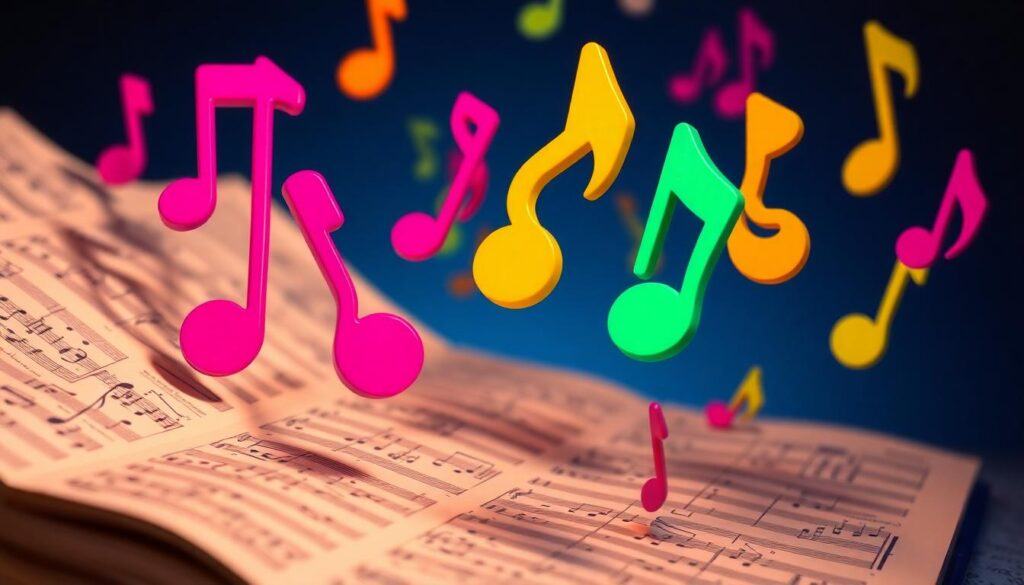
When we talk about childhood or teenage years, music often plays a significant role. Remember the anthems of your high school years or the lullabies of your childhood?
Each song marks a time in your life and reflects who you were becoming and the friends you made. Just one line from a favorite college song can quickly bring back the feelings of freedom and hope you had back then.
Music is inherently linked to our perception of time, not just linearly but emotionally. It sets up a backdrop for our present moments, adding depth and color to our everyday experiences.
Whether it’s a song that saw us through homesickness or one that accompanied an epic road trip, these tunes map out the emotional topography of our lives.
And yet, this mapping isn’t solely an individual experience. Music often acts as a universal language, creating collective memories.
Consider popular songs played during significant events, they become woven into the societal tapestry, shared by many. These collective experiences add another layer to our recollections, connecting to our past, each other, and as part of a larger human narrative.
Have you ever noticed how books, films, television, video games, and yes, music, seem to pull at the threads of your past with intense familiarity?
That’s because these forms of media have mastered the art of exploiting nostalgia, making it an effective tool for stirring emotions.
Now, this isn’t just about tapping into the sweetness of yesteryear; it’s a strategic move.
In music, melodies and lyrics can recall the ‘good ol’ days,’ creating a comforting, and sometimes bittersweet, connection with the audience. And there’s no denying the tendency people have for reminiscing over simpler or happier times.
Nostalgia often skips past our logical thinking and goes straight to our feelings. It can make us long for the past in a way that’s tough to ignore. For example, a song playing during your first kiss or one that helped you through tough times can leave a lasting impact.
Marketing nostalgia isn’t an accident. Music creators often aim for the sentimental sweet spot, and they’re pretty good at it. Classic chord progressions and vintage synthesizer tones are just the tip of the iceberg.
This calculated approach hooks listeners, sometimes even prompting them to make purchases related to their memories.
So, it stands to reason, nostalgia sells. It’s about selling an experience, an era, or a feeling. It’s compelling, it’s powerful, and frankly, it’s profitable. From throwback-themed playlists to retro album designs, the industry knows how to get listeners pining for the past.
As we push forward into a deeper understanding of how nostalgia influences our listening habits, remember it’s a complex dance between our psyche and the music. When done right, exploiting nostalgia can turn a simple melody into an anthem of eras gone by.
It’s not just a one-way street between our ears and our hearts.
When you hit play on an old favorite song, it’s not just the melody or the lyrics that flood back, it’s the whole scene.
Maybe you’re suddenly sixteen again, windows down, with the world rushing by as if you had no place to be.
Music has this profound ability to anchor itself to moments in our lives, creating a link between sound and memory that is almost inseparable.
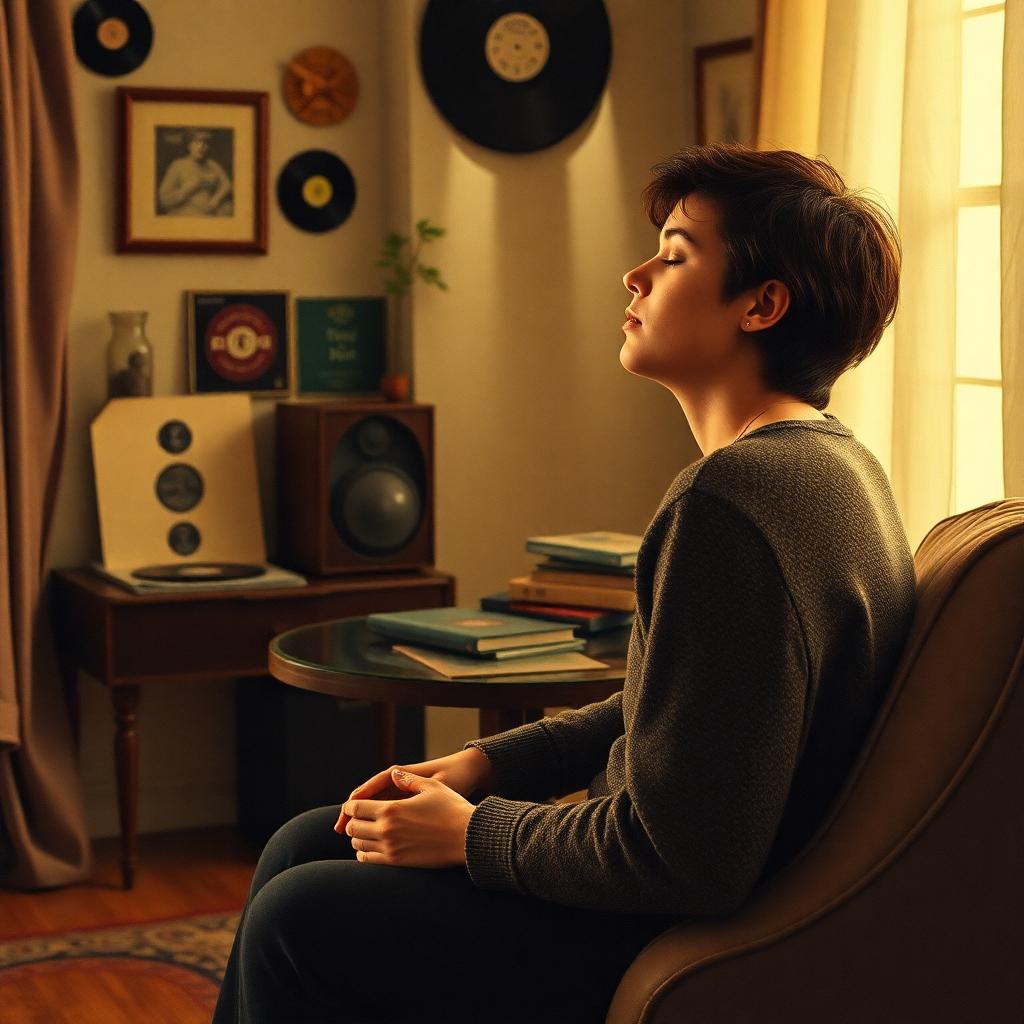
When you hit play on an old favorite song, it’s not just the melody or the lyrics that flood back – it’s the whole scene. Maybe you’re suddenly sixteen again, windows down, with the world rushing by as if you had no place to be.
Music has this profound ability to anchor itself to moments in our lives, creating a link between sound and memory that is almost inseparable.
Let’s dig a bit deeper into the psychology of this nostalgia.
It revolves around a concept known as associative memory. This is where your brain links a piece of music with a particular event, person, or period. And the connection is strong – so strong that hearing that music can whisk you back to those emotions associated with those times.
Nostalgia can be a bit of a mixed bag.
On one hand, it feels like a comforting blanket, warmly wrapping us in memories from happier times. These musical blasts from the past provide comfort, offering an escape to when life may have been simpler.
On the other hand, nostalgia also has its downsides, sometimes pushing us to think about missed chances, lost loves, or how time keeps moving forward without pause.
So, I’m not suggesting you shy away from revisiting these musical landmarks in your history. You’ll find there’s a richness in embracing the full array of emotions they bring. Each listen can be a trip through the highs and lows, giving you a chance to process, reflect, and grow.
There’s something else worth musing over – how these memories influence the music makers of today. Imagine how artists tap into their hazy reflections, weaving them into new songs.
By combining their pasts with musical elements that resonated back in ‘the day’, they create tracks that are not just theirs but become the backdrop for our future reminiscing.
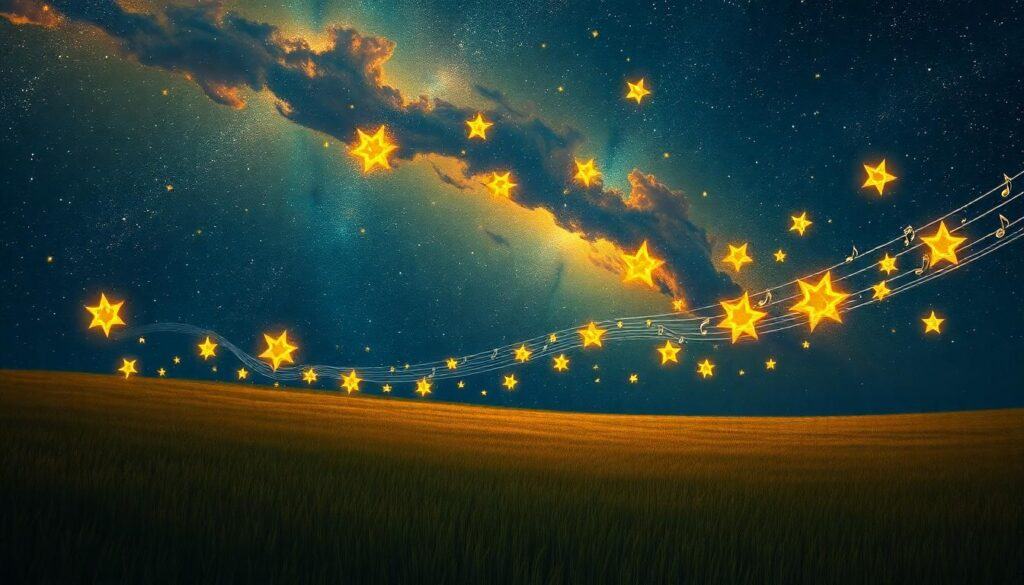
As we’ve seen, nostalgia is more than just looking back at happy memories; it’s a mix of feelings and brain reactions that musicians have used for years. But what does this mean for music in the future?
Today’s musicians and producers often add a sense of nostalgia to their new songs. They pick sounds and lyrics that fit what people care about now, but also could become the songs we feel nostalgic about in the future.
Whether it’s through retro synth sounds reminiscent of the 80s, sampling classic tunes, or lyrics that capture the zeitgeist of today, they’re purposefully creating layers of nostalgia.
Looking ahead, the music we cherish right now is destined to be the backdrop for future generations’ formative moments. In a sense, we’re all participants in a cycle of nostalgia, whether we’re creating the music or simply listening to it.
Music artists have the unique power to craft experiences that will linger in our collective consciousness, potentially becoming future nostalgic triggers. Just as certain tunes remind you of that perfect vacation, years from now, today’s hit may remind someone of their first love or a pivotal personal achievement.
The beauty of musical expression lies in its ability to evolve and adapt, much like our own memories. After all, the emotions we invest in music today may become the cherished memories of tomorrow.

I’ve been playing guitar 40 years now; writing, recording, and rocking in bands. Randy Rhoads, Warren DiMartini, and of course, Jimi Hendrix all lit the fire for me, and I’ve been chasing that passion ever since.